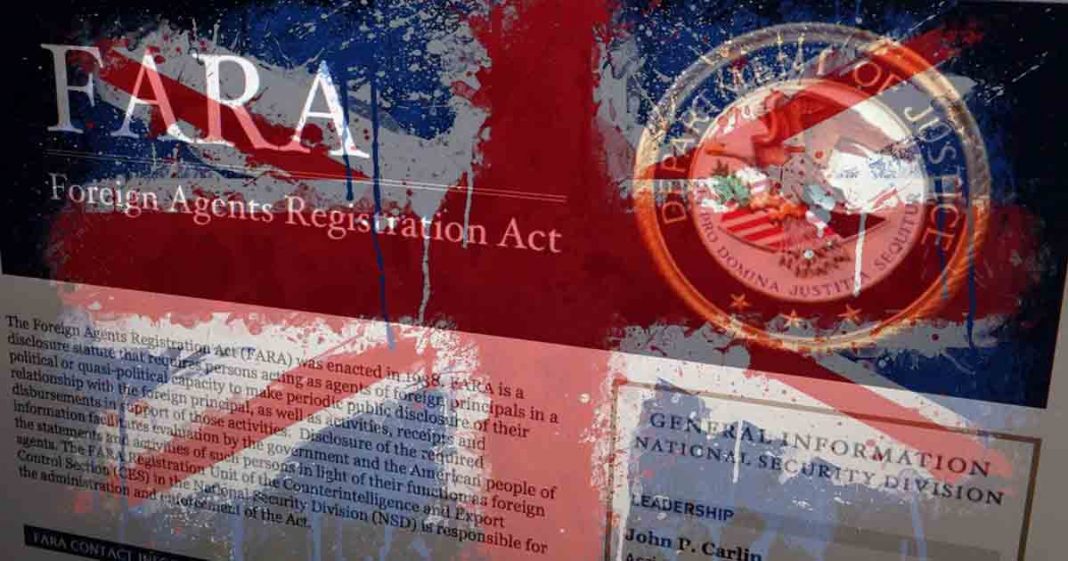The UK government confirmed on Wednesday that it would introduce an espionage bill to modernize its security laws following the publication of a long-awaited report into Russian interference in British politics.
NB when #russia passed 2012 law, requiring registration of NGOs etc receiving foreign money (& modelled on #US law), #UK made huge fuss re human rights, free speech etc etc. #RussiaReport
BBC News – Russia report: What would tougher spy laws mean for UK? https://t.co/AMt2f9vRdO
— marydejevsky (@marydejevsky) July 23, 2020
The prime minister’s spokesman said the plans included “the review of the Official Secrets Act and also considering the introduction of a form of foreign agent registration such as that which some of our allies have.”
New registration laws for the UK
The idea echoes the 1938 US Foreign Agents Registration Act (FARA), which requires Americans and non-Americans alike to disclose if they are working on behalf of foreign governments, register with the US Department of Justice and report on their own activities.
Read more: Russian electoral hijack: British MPs furious at government
Transport Secretary Grant Shapps told Sky News: “We are looking at additional powers to look at the activities of hostile states and that may include introducing new laws.”
These new laws could include “something like the foreign agent registration laws that exist for example in the US and Australia.”
The Russia report, which accused the government of carelessness and underestimating Moscow, recommended updating Britain’s espionage laws, explicitly citing FARA as an example to emulate.
Britain’s most senior police officer called yesterday for the Official Secrets Act to be “firmed up” and said the public should be concerned about the threat from Russia https://t.co/tqAvH4ngRW
— The Times and The Sunday Times (@thetimes) July 23, 2020
Russian report citing alleged failure of MPs
The report’s central allegation was that ministers and spy agencies had failed to look into possible Kremlin interference in the 2016 Brexit referendum. But Mr Brokenshire said he “categorically reject[ed] any suggestion that the UK actively avoided investigating Russia”.
Earlier in the day, Boris Johnson told MPs that “no country in the western world is more vigilant” in countering Russia, and claimed that allegations of Moscow interfering in the Brexit referendum were propagated by “Islingtonian Remainers”, a reference to the inner London borough where the prime minister used to live and that voted overwhelmingly to stay in the EU in 2016.
Mr Brokenshire, who was responding to an urgent question, told the Commons that the government was committed to updating out-of-date espionage legislation to give security services more powers.
The Espionage Bill, brought forward in last year’s Queen’s Speech, will provide the basis for a tougher set of powers and would include a review of the Official Secrets Act.
Read more: U.S indicts 12 Russian spies for hacking 2016 presidential campaign before Trump-Putin meeting
Ministers will also consider whether to follow allies such as the US and Australia “in adopting a form of foreign agent registration”. The move would force officials working on behalf of foreign governments to register with the authorities and would allow Britain to extradite those who fail to register.
UK spy’espionage’ bill makes it easier to prosecute double agents
Andrew Parker, the former head of MI5, the UK’s domestic intelligence agency, provided evidence to parliament’s Intelligence and Security Committee that wrote the Russia report.
“Today, it is not an offense in any sense to be a covert agent of the Russian intelligence services in the UK — just to be that, to be in covert contact, to be pursuing a brief — unless you acquire damaging secrets and give them to your masters,” Parker said.
He said the UK’s current Official Secrets Act had become “dusty and largely ineffective.”
Read more: Stop ‘destabilizing’ UK, May to Putin
“We are left with something which makes it very hard to deal with some of the situations we are talking about today in the realm of the economic sphere, cyber, things that could be more to do with influence,” he said.
Nigel Inkster, the former director of operations and intelligence at MI6, the UK’s foreign intelligence agency, told the BBC: “The 1911 [Official Secrets] Act, and modified in 1989, really leaves the security services and police in a situation where unless they can actually catch somebody red-handed taking delivery of papers marked ‘Secret,’ it is really difficult to prosecute anybody for espionage.
Read more: UK warns Russia against ‘chess games’ over alleged spy
“So, if this new register is brought into effect, of course it is not going to stop countries like Russia from sending covert operatives to the United Kingdom to undertake intelligence operations, but it does make it possible, more realistically, to prosecute the people who are supplying them with information — their agents.”
Anadolu with additional input by GVS News Desk














